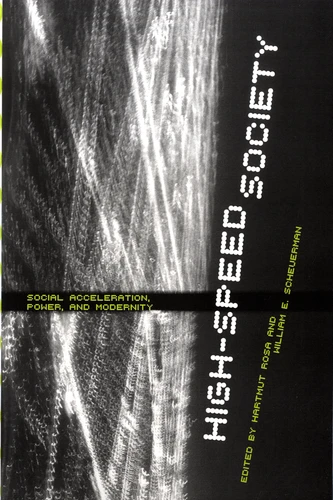High - Speed Society. Social Acceleration, Power, and Modernity
Par : ,Formats :
- Paiement en ligne :
- Livraison à domicile ou en point Mondial Relay estimée à partir du 8 décembreCet article sera commandé chez un fournisseur et vous sera envoyé 10 jours après la date de votre commande.
- Retrait Click and Collect en magasin gratuit
- Livraison à domicile ou en point Mondial Relay estimée à partir du 8 décembre
- Réservation en ligne avec paiement en magasin :
- Indisponible pour réserver et payer en magasin
- Nombre de pages314
- PrésentationBroché
- Poids0.505 kg
- Dimensions15,6 cm × 23,7 cm × 3,0 cm
- ISBN978-0-271-03417-1
- EAN9780271034171
- Date de parution04/07/2008
- ÉditeurPennsylvania State University
Résumé
Everywhere, life seems to be speeding up : we talk of "fast food" and "speed dating." But what does the phenomenon of social acceleration really entail, and how new is it ? While much has been written about our high-speed society in the popular media, serious academic analysis has lagged behind, and what literature there is comes more from Europe than from America. This collection of essays is a first step toward exposing readers on this side of the Atlantic to the importance of this phenomenon and toward developing some preliminary conceptual categories for better understanding it.
Among the major questions the volume addresses are these : Is acceleration occurring across all sectors of society and all dimensions of life, or is it affecting some more than others ? Where is life not speeding up, and what results from this disparity ? What are the fundamental causes of acceleration, as well as its consequences for everyday experience ? How does it affect our political and legal institutions ? How much speed can we tolerate ? The volume tackles these questions in three sections.
Part 1 offers a selection of astute early analyses of acceleration as experienced in the late nineteenth and early twentieth centuries. Part 2 samples recent attempts at analyzing social acceleration, including translations of the work of leading European thinkers. Part 3 explores acceleration's political implications.
Among the major questions the volume addresses are these : Is acceleration occurring across all sectors of society and all dimensions of life, or is it affecting some more than others ? Where is life not speeding up, and what results from this disparity ? What are the fundamental causes of acceleration, as well as its consequences for everyday experience ? How does it affect our political and legal institutions ? How much speed can we tolerate ? The volume tackles these questions in three sections.
Part 1 offers a selection of astute early analyses of acceleration as experienced in the late nineteenth and early twentieth centuries. Part 2 samples recent attempts at analyzing social acceleration, including translations of the work of leading European thinkers. Part 3 explores acceleration's political implications.
Everywhere, life seems to be speeding up : we talk of "fast food" and "speed dating." But what does the phenomenon of social acceleration really entail, and how new is it ? While much has been written about our high-speed society in the popular media, serious academic analysis has lagged behind, and what literature there is comes more from Europe than from America. This collection of essays is a first step toward exposing readers on this side of the Atlantic to the importance of this phenomenon and toward developing some preliminary conceptual categories for better understanding it.
Among the major questions the volume addresses are these : Is acceleration occurring across all sectors of society and all dimensions of life, or is it affecting some more than others ? Where is life not speeding up, and what results from this disparity ? What are the fundamental causes of acceleration, as well as its consequences for everyday experience ? How does it affect our political and legal institutions ? How much speed can we tolerate ? The volume tackles these questions in three sections.
Part 1 offers a selection of astute early analyses of acceleration as experienced in the late nineteenth and early twentieth centuries. Part 2 samples recent attempts at analyzing social acceleration, including translations of the work of leading European thinkers. Part 3 explores acceleration's political implications.
Among the major questions the volume addresses are these : Is acceleration occurring across all sectors of society and all dimensions of life, or is it affecting some more than others ? Where is life not speeding up, and what results from this disparity ? What are the fundamental causes of acceleration, as well as its consequences for everyday experience ? How does it affect our political and legal institutions ? How much speed can we tolerate ? The volume tackles these questions in three sections.
Part 1 offers a selection of astute early analyses of acceleration as experienced in the late nineteenth and early twentieth centuries. Part 2 samples recent attempts at analyzing social acceleration, including translations of the work of leading European thinkers. Part 3 explores acceleration's political implications.





